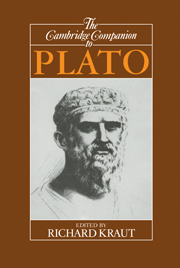Book contents
- Frontmatter
- 1 Introduction to the study of Plato
- 2 Plato
- 3 Stylometry and chronology
- 4 Socrates and the early dialogues
- 5 Mathematical method and philosophical truth
- 6 Inquiry in the Meno
- 7 Plato and Greek religion
- 8 Platonic love
- 9 Plato's metaphysical epistemology
- 10 The defense of justice in Plato's Republic
- 11 Plato on poetic creativity
- 12 Good-bye to the Third Man
- 13 Plato's Sophist on false statements
- 14 Disintegration and restoration
- 15 Plato's later political thought
- Bibliography
- Index
10 - The defense of justice in Plato's Republic
Published online by Cambridge University Press: 28 May 2006
- Frontmatter
- 1 Introduction to the study of Plato
- 2 Plato
- 3 Stylometry and chronology
- 4 Socrates and the early dialogues
- 5 Mathematical method and philosophical truth
- 6 Inquiry in the Meno
- 7 Plato and Greek religion
- 8 Platonic love
- 9 Plato's metaphysical epistemology
- 10 The defense of justice in Plato's Republic
- 11 Plato on poetic creativity
- 12 Good-bye to the Third Man
- 13 Plato's Sophist on false statements
- 14 Disintegration and restoration
- 15 Plato's later political thought
- Bibliography
- Index
Summary
In this essay I will try to identify and explain the fundamental argument of Plato's Republic for the astonishing thesis that justice is so great a good that anyone who fully possesses it is better off, even in the midst of severe misfortune, than a consummately unjust person who enjoys the social rewards usually received by the just. Plato's attempt to defend this remarkable claim is of course the unifying thread of the dialogue, but his argument ranges so widely over diverse topics that it is difficult to see how it all fits together, and anyone who attempts to state his argument must take a stand on interpretive issues about which there is considerable scholarly controversy. The dialogue's difficulty is increased by Plato's failure to give any explicit justification for the complex moral equation he boldly announces: Justice discounted by pain and dishonor is more advantageous than injustice supplemented by the rewards of justice. Even if he manages to show that justice is the greatest single good, we are still left wondering whether its value is high enough to make this equation come out right.
- Type
- Chapter
- Information
- The Cambridge Companion to Plato , pp. 311 - 337Publisher: Cambridge University PressPrint publication year: 1992
- 20
- Cited by

